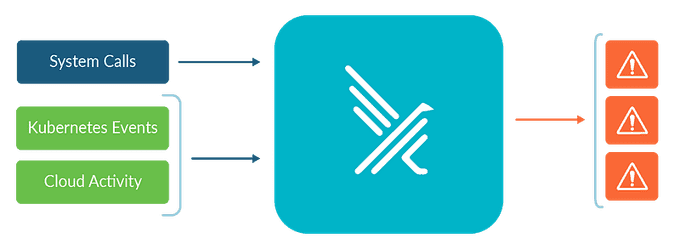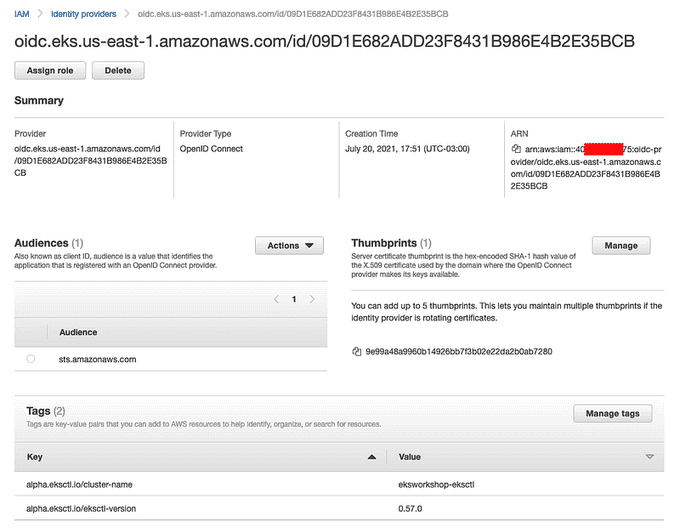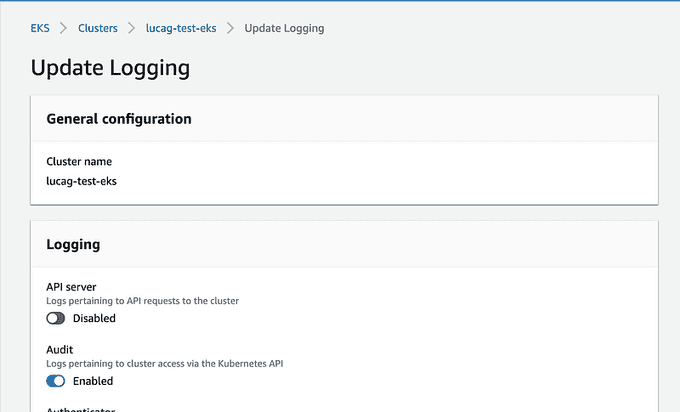
Monitoring AWS EKS Audit Logs with Falco
Content
🔍 Detecting Threats in AWS EKS Audit Logs with Falco
📑 Introduction
AWS EKS Audit Logs provide a detailed record of all activity on your EKS cluster, including user actions, API calls, and system events. This information can be used to track changes to your cluster, detect suspicious activity, and troubleshoot problems.
Falco is a Kubernetes threat detection engine that can be used to monitor AWS EKS Audit Logs for suspicious activity. Falco uses a set of rules to detect events that may indicate a security breach or attack. For example, Falco can detect events such as:
- Containers running with elevated privileges
- Containers accessing sensitive files or resources
- Containers communicating with known malicious IP addresses
By monitoring AWS EKS Audit Logs with Falco, you can improve the security of your Kubernetes clusters and detect threats early.
In this blog post, we will show you how to configure Falco to monitor AWS EKS Audit Logs. We will also discuss some of the benefits of using Falco to monitor EKS Audit Logs.

🛡️ Falco: What is it and How it Works
Falco is a Kubernetes threat detection engine. Falco supports Kubernetes Audit Events to track the changes defined in k8s audit rules made to your cluster.
Unfortunately, AWS EKS is a managed Kubernetes service, and it only can send audit logs to CloudWatch. This means there is no direct way for Falco to inspect the EKS audit events. We need to implement a solution to ship audit logs from CloudWatch to Falco.
There are three solutions:
- EKS CloudWatch
- Falco EKS Audit Bridge (Not recommended due to complexity and additional setup requirements like S3 bucket and AWS Kinesis Firehose service)
- Kubernetes Audit Events Plugin for EKS: This plugin supports consuming Kubernetes Audit Events stored in CloudWatch Logs for the EKS Clusters.
📋 Prerequisites
🔧 Enable Audit in EKS Cluster Ensure that audit logging is enabled in your EKS cluster:

🔐 Enable IAM Roles for Service Accounts (IRSA)
Enable IAM Roles for Service Accounts (IRSA) on the EKS cluster if you have not enabled it yet:

🚀 Install Falco Server
The deployment of Falco in a Kubernetes cluster is managed through a Helm chart. This chart handles all the Kubernetes objects needed by Falco to be seamlessly integrated into your environment.
Based on the configuration in the values.yaml file, the chart will render and install the required Kubernetes objects. Keep in mind that Falco can be deployed in your cluster using either a DaemonSet or a Deployment.
⚠️ Kernel Version Check
Before installing Falco in a Kubernetes cluster, ensure that the kernel version used in the nodes is supported by the community. Also, before reporting any issues with Falco (e.g., missing kernel image, CrashLoopBackOff), make sure to read about the driver section and adjust your setup as required.
📥 Adding FalcoSecurity Repository
Before installing the chart, add the FalcoSecurity charts repository:
helm repo add falcosecurity https://falcosecurity.github.io/charts
helm repo update📥 Adding Falco Security Repository
Before installing the chart, add the Falco Security charts repository:
helm repo add falcosecurity https://falcosecurity.github.io/charts
helm repo update🚀 Installing the Chart
To install the chart with the release name falco in namespace falco, run:
helm install falco falcosecurity/falco --namespace falco \
--create-namespace --values-k8saudit.yamlvalues-k8saudit.yaml Configuration
# -- Disable the drivers since we want to deploy only the k8saudit plugin.
driver:
enabled: false
# -- Disable the collectors, no syscall events to enrich with metadata.
collectors:
enabled: false
# -- Deploy Falco as a deployment. One instance of Falco is enough. Anyway the number of replicas is configurable.
controller:
kind: deployment
deployment:
replicas: 1
falcoctl:
artifact:
install:
enabled: true
follow:
enabled: true
config:
artifact:
install:
resolveDeps: false
refs: [k8saudit-rules:0.6]
follow:
refs: [k8saudit-rules:0.6]
services:
- name: k8saudit-webhook
type: NodePort
ports:
- port: 9765
nodePort: 30007
protocol: TCP
falco:
rules_file:
- /etc/falco/k8s_audit_rules.yaml
- /etc/falco/rules.d
plugins:
- name: k8saudit
library_path: libk8saudit.so
init_config: ""
open_params: "http://:9765/k8s-audit"
- name: json
library_path: libjson.so
init_config: ""
load_plugins: [k8saudit, json]For more details, refer to the Falco Helm Chart documentation.
After a few minutes, Falco instances should be running on all your nodes. The status of Falco pods can be inspected through kubectl:
kubectl get pods -n falco -o wideIf everything went smoothly, you should observe an output similar to the following, indicating that all Falco instances are up and running in your cluster.
Helm will also expose a service with the Helm application name prefix. It is falco in this deployment.
📡 EKS CloudWatch: Forward EKS CloudWatch k8s Audit Events to Sysdig
The following instructions show how to deploy a simple application that reads EKS Kubernetes audit logs and forwards them to the Sysdig Secure agent. The steps below show an example configuration implemented with the AWS console, but the same can be done with scripts, API calls, or Infrastructure-as-Code configurations.
These instructions have been tested with eks.5 on Kubernetes v1.14.
🛠️ EKS Setup: Enable CloudWatch Audit Logs
Your EKS cluster needs to be configured to forward audit logs to CloudWatch, which is disabled by default.
- Open the EKS dashboard from the AWS console.
- Select your cluster > Logging > Update and enable Audit.

🌐 EKS Setup: Configure the VPC Endpoint
Your VPC needs an endpoint for the service com.amazonaws.<your-region>.logs, accessible from all the EKS security groups.
- Open the VPC dashboard from the AWS console.
- Select Endpoints > Create Endpoints.
- Select Find service by name, enter
com.amazonaws.<your-region>.logsand click "Verify". - Under VPC, select your cluster's VPC.
- Select all security groups.
🛡️ EKS Setup: Configure EC2 Instance Profiles and Roles
The EC2 instances that make up your EKS cluster must have the necessary permission to read CloudWatch logs. Usually, they all use the same IAM Role, so that is the one to configure.
- Open the EC2 dashboard from the AWS console.
- Select the AWS EC2 instances that are configured as cluster nodes.
- Select the associated IAM Role, which should be the same for all nodes.
- Find the policy
CloudWatchReadOnlyAccessand attach it.

Configure IAM role and policy for IRSA: Create a policy called ekscloudwatch-eks-cw-policy then create a role with a Trust Relationship for and attach the policy above which is called ekscloudwatch-eks-cw-role in this deployment
## 🛠️ IAM Policy for CloudWatch Logs Access
To allow your EKS cluster to read CloudWatch logs, create the following IAM policy:
```json
{
"Version": "2012-10-17",
"Statement": [
{
"Sid": "",
"Effect": "Allow",
"Action": [
"logs:List*",
"logs:Get*",
"logs:FilterLogEvents",
"logs:Describe*",
"cloudwatch:List*",
"cloudwatch:Get*",
"cloudwatch:Describe*"
],
"Resource": "arn:aws:logs:*:*:log-group:/aws/eks/*"
}
]
}🔐 IAM Role for Service Account
Edit the following trust relationship for the IAM role ekscloudwatch-eks-cw-role to allow the service account in the falco namespace to assume the role:
{
"Version": "2012-10-17",
"Statement": [
{
"Sid": "",
"Effect": "Allow",
"Principal": {
"Federated": "arn:aws:iam::12345678910:oidc-provider/oidc.eks.eu-west-1.amazonaws.com/id/1847B92748AB2A2XYZ"
},
"Action": "sts:AssumeRoleWithWebIdentity",
"Condition": {
"StringEquals": {
"oidc.eks.eu-west-1.amazonaws.com/id/1847B92748AB2A2XYZ:sub": "system:serviceaccount:falco:ekscloudwatch"
}
}
}
]
}📄 Kubernetes Configuration
Edit the following Kubernetes resources to configure the service account, config map, and deployment for forwarding EKS CloudWatch logs to Falco.
Service Account
apiVersion: v1
kind: ServiceAccount
metadata:
name: ekscloudwatch
namespace: falco
annotations:
eks.amazonaws.com/role-arn: "arn:aws:iam::12345678910:role/ekscloudwatch-eks-cw-role"ConfigMap
apiVersion: v1
kind: ConfigMap
metadata:
name: ekscloudwatch-config
namespace: falco
data:
endpoint: "http://falco-k8saudit-webhook:9765/k8s-audit"
cw_polling: "5m"
cw_filter: '{ $.sourceIPs[0] != "::1" && $.sourceIPs[0] != "127.0.0.1" }'
cluster_name: "my-eks-cluster"
aws_region: "eu-west-1"Deployment
apiVersion: apps/v1
kind: Deployment
metadata:
name: eks-cloudwatch
namespace: falco
spec:
minReadySeconds: 5
replicas: 1
selector:
matchLabels:
app: eks-cloudwatch
template:
metadata:
labels:
app: eks-cloudwatch
spec:
serviceAccountName: ekscloudwatch
securityContext:
fsGroup: 65534
containers:
- image: sysdiglabs/k8sauditlogforwarder:ekscloudwatch-0.3
imagePullPolicy: Always
name: eks-cloudwatch-container
env:
- name: ENDPOINT
valueFrom:
configMapKeyRef:
name: ekscloudwatch-config
key: endpoint
- name: CLUSTER_NAME
valueFrom:
configMapKeyRef:
name: ekscloudwatch-config
key: cluster_name
- name: AWS_REGION
valueFrom:
configMapKeyRef:
name: ekscloudwatch-config
key: aws_region
- name: CW_POLLING
valueFrom:
configMapKeyRef:
name: ekscloudwatch-config
key: cw_polling
- name: CW_FILTER
valueFrom:
configMapKeyRef:
name: ekscloudwatch-config
key: cw_filter- Edit the value of
eks.amazonaws.com/role-arnin the ServiceAccount with your role ARN:
eks.amazonaws.com/role-arn: "arn:aws:iam::12345678910:role/ekscloudwatch-eks-cw-role"- Edit
cluster_name: "my-eks-cluster"with your cluster name in the ConfigMap. - Edit
endpoint: "http://falco-k8saudit-webhook:9765/k8s-audit"if you installed Falco with a different name thanfalco. - Don't forget to set your region
aws_region. If you don't set it,ekscloudwatchwill call EC2 IMDSv1 to get the region name.
Deploy ekscloudwatch:
kubectl apply -f .You can get details of the rules at: Falco Security Rules.
Kubernetes Audit Events Plugin for EKS
This plugin extends Falco to support Kubernetes Audit Events from AWS EKS clusters as a new data source. For more details about what Audit logs are, see the README of k8saudit plugin.
Functionality
This plugin supports consuming Kubernetes Audit Events stored in CloudWatch Logs for the EKS Clusters. See the AWS official documentation for details.
Capabilities
The k8saudit-eks uses the field extraction methods of the k8saudit plugin as the format for the Audit Logs is the same.
Event Source
The event source for Kubernetes Audit Events from EKS is k8s_audit. It allows using the same rules as the k8saudit plugin.
Configuration
Here's an example of the configuration in falco.yaml:
plugins:
- name: k8saudit-eks
library_path: libk8saudit-eks.so
init_config:
region: "eu-west-1"
profile: "default"
shift: 10
polling_interval: 10
use_async: false
buffer_size: 500
open_params: "my-cluster"
- name: json
library_path: libjson.so
init_config: ""
load_plugins: [k8saudit-eks, json]⚙️ Initialization Config
- profile: The Profile to use to create the session, env var
AWS_PROFILEif present. - region: The Region of your EKS cluster, env var
AWS_REGIONis used if present. - use_async: If true, then async extraction optimization is enabled (Default: true).
- polling_interval: Polling Interval in seconds (default: 5s).
- shift: Time shift in past in seconds (default: 1s).
- buffer_size: Buffer Size (default: 200).
🔧 Open Parameters
A string which contains the name of your EKS Cluster (required).
📜 Rules
The k8saudit-eks plugin ships with no default rule for test purposes. You can use the same rules as those for the k8saudit plugin. See here.
To test if it works, you can use this example rule:
- required_engine_version: 15
- required_plugin_versions:
- name: k8saudit-eks
version: 0.2.0
- rule: Dummy rule
desc: >
Dummy rule
condition: >
ka.verb in (get,create,delete,update)
output: user=%ka.user.name verb=%ka.verb target=%ka.target.name target.namespace=%ka.target.namespace resource=%ka.target.resource
priority: WARNING
source: k8s_audit
tags: [k8s]🔐 AWS IAM Policy Permissions
This plugin retrieves Kubernetes audit events from Amazon CloudWatch Logs and therefore needs appropriate permissions to perform these actions. If you use a profile or associate a role to the service account in Kubernetes with an OIDC provider, you need to grant it permissions.
Here is an AWS IAM policy document that satisfies the requirements:
{
"Version": "2012-10-17",
"Statement": [
{
"Sid": "ReadAccessToCloudWatchLogs",
"Effect": "Allow",
"Action": [
"logs:Describe*",
"logs:FilterLogEvents",
"logs:Get*",
"logs:List*"
],
"Resource": [
"arn:aws:logs:${REGION}:${ACCOUNT_ID}:log-group:/aws/eks/${CLUSTER_NAME}/cluster:*"
]
}
]
}Replace the placeholders REGION, ACCOUNT_ID, and CLUSTER_NAME with appropriate values.
🖥️ Running Locally
This plugin requires Falco with version >= 0.35.0.
falco -c falco.yaml -r rules/k8s_audit_rules.yaml
17:48:41.067076000: Warning user=eks:certificate-controller verb=get target=eks-certificates-controller target.namespace=kube-system resource=configmapsEvents detected: 1
Rule counts by severity:
WARNING: 1
Triggered rules by rule name:
Dummy rule: 1
Syscall event drop monitoring:
- event drop detected: 0 occurrences
- num times actions taken: 0For more details, refer to the Falco documentation.
Running in EKS
When running Falco with the k8saudit-eks plugin in a Kubernetes cluster, you can't have more than one pod at once. The plugin pulls the logs from CloudWatch Logs, and having multiple instances will lead to multiple gatherings of the same logs and the duplication of alerts.
You can use the official Falco Helm chart to deploy it with the k8saudit-eks plugin as a single replica deployment. You can also use it to associate the IAM role you created (see AWS IAM Policy Permissions).
Example values.yaml
tty: true
kubernetes: false # Disable the collection of k8s metadata
falco:
rules_file:
- /etc/falco/k8s_audit_rules.yaml # Rules to use
- /etc/falco/rules.d
plugins:
- name: k8saudit-eks
library_path: libk8saudit-eks.so
init_config:
region: ${REGION} # Replace with your region
shift: 10
polling_interval: 10
use_async: false
buffer_size: 500
open_params: ${CLUSTER_NAME} # Replace with your cluster name
- name: json
library_path: libjson.so
init_config: ""
load_plugins: [k8saudit-eks, json] # Plugins to load
driver:
enabled: false # Disable the collection of syscalls
collectors:
enabled: false # Disable the collection of container metadata
controller:
kind: deployment
deployment:
replicas: 1 # Single replica deployment to avoid duplication of alerts
falcoctl: # Use falcoctl to install automatically the plugin and the rules
indexes:
- name: falcosecurity
url: https://falcosecurity.github.io/falcoctl/index.yaml
artifact:
install:
enabled: true
follow:
enabled: true
config:
artifact:
allowedTypes:
- plugin
- rulesfile
install:
resolveDeps: false
refs: [k8saudit-rules:0, k8saudit-eks:0, json:0]
follow:
refs: [k8saudit-rules:0]
serviceAccount:
create: true
annotations:
- eks.amazonaws.com/role-arn: arn:aws:iam::${ACCOUNT_ID}:role/${ROLE} # If you use an OIDC provider, you can attach a role to the service account📝 Conclusion
To enhance your Kubernetes security strategy, it is important to be attentive to new features and improvements, incorporating those that will let you gain visibility into suspicious events or misconfigurations like Kubernetes audit log events.
The information gathered in these logs can be very useful to understand what is going on in our cluster and can even be required for compliance purposes. Tuning the rules with care and using less verbose mode when required can also help us lower costs when using a SaaS centralized logging solution.
But what really makes a difference here is the use of Falco as a threat detection engine. Choosing it to be your webhook backend is the first step towards enforcing Kubernetes security best practices, detecting misuse, and filling the gap between what you think the cluster is running and what's actually running.
For more details, refer to the Falco documentation.
If you would like to find out more about Falco:
- Get started in Falco.org
- Check out the Falco project in GitHub.
- Get involved in the Falco community.
- Meet the maintainers on the Falco Slack.
- Follow @falco_org on X/Twitter.
Until next time, つづく 🎉
💡 Thank you for Reading !! 🙌🏻😁📃, see you in the next blog.🤘 Until next time 🎉
🚀 Thank you for sticking up till the end. If you have any questions/feedback regarding this blog feel free to connect with me:
♻️ LinkedIn: https://www.linkedin.com/in/rajhi-saif/
♻️ X/Twitter: https://x.com/rajhisaifeddine
The end ✌🏻
🔰 Keep Learning !! Keep Sharing !! 🔰
📅 Stay updated
Subscribe to our newsletter for more insights on AWS cloud computing and containers.
